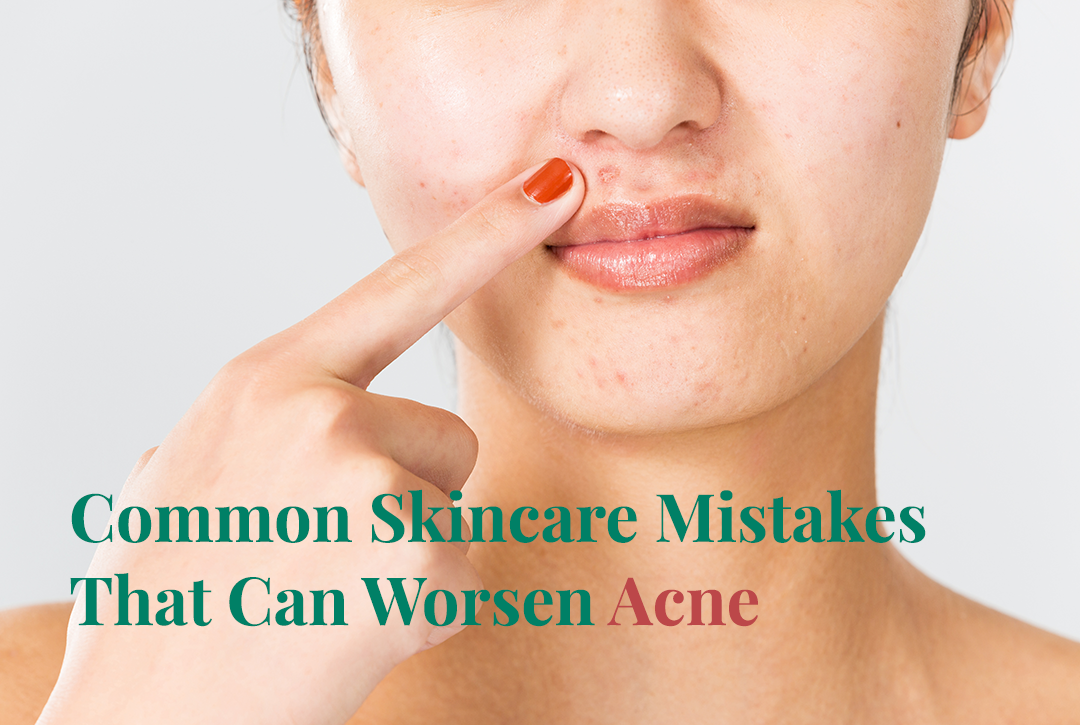Common Skincare Mistakes That Can Worsen Acne

The constant struggle with acne can be an unnerving experience that emotionally affects one’s self-esteem. While some individuals would have outgrown acne after their teenage years, others may continue to battle them through adulthood.
Hormonal changes or certain diets can be responsible for triggering acne breakouts. In some cases, improper skincare practices can also cause persistent acne. If you experience seeing more breakouts despite attempts to treat them, read on to find out if you have committed these common skincare mistakes.
Not Washing Your Face Properly
Washing your face is the most basic but essential step to caring for your skin, and it begins with choosing an appropriate cleanser for your skin type. For acne-prone skin, opt for cleansers that contain acne-fighting ingredients such as salicylic acid.
Allow enough time to let the cleanser work its effect. Rinsing your face too quickly can cause the active ingredient to lose its efficacy in fighting acne. Leftover residues from not rinsing thoroughly after cleansing could also lead to dry skin and more breakouts.
Tip:
To wash your face properly, apply a pea-size amount of cleanser with clean hands. The cleanser you choose should be gentle for your skin. Massage the cleanser gently onto your skin for approximately 60 seconds before rinsing off with lukewarm water. Pat your skin dry with a clean towel.
Skipping Moisturiser and Sunscreen
There is a common misconception that people with oily skin should skip moisturiser. Whether you have oily or acne-prone skin, it is essential to use a daily moisturiser as dehydrated skin can cause excess sebum to be produced, eventually resulting in clogged pores and acne.
Tip:
Not fond of moisturisers making your skin look greasy? Look out for moisturisers with water-based or gel-like formula as they are lightweight and do not weigh down your skin.
Similarly, some individuals with acne-prone skin tend to skip sunscreen as they believe it will clog their pores. If sunscreen is the reason behind your breakouts, choose one that is labelled oil-free and non-comedogenic instead.
On the other hand, not applying sunscreen can be detrimental to your existing acne. The sun’s UV rays can cause damage to your skin barrier, and dry out your skin, increasing oil production and leading to more breakouts. Insufficient sun protection can also cause your skin to be more susceptible to ageing and hyperpigmentation, worsening the appearance of your acne scars.
Using Harsh Exfoliating Products
Acne occurs when pores become clogged with sebum and dead skin cells. As part of your preventive skin prep routine, you are probably using an exfoliating facial product to slough off those dead skin cells.
While regular exfoliation helps remove dull surface debris and improve acne, did you know choosing the right exfoliating product for your skin type matters? Abrasive exfoliants, such as granular scrubs, should be avoided as they can irritate your existing acne and increase the chances of more breakouts. When having acne, the last thing you would want is to aggravate them.
Tip:
For acne-prone skin, try chemical exfoliants such as alpha hydroxy acids (AHAs) or beta hydroxy acids (BHAs), which can help reduce inflammation, remove dead skin cells, and improve overall skin texture.
Examples of AHAs
- Glycolic acid
- Citric acid
- Lactic acid
Examples of BHAs
- Salicylic acid
- Trethocanic acid
However, high doses of these acids can cause irritation and damage to your skin barrier, so apply them in moderation or speak to a dermatologist for advice.
Applying Too Much Acne Medications
When a new pimple is spotted, avoid applying topical acne medications several times a day to speed up the healing process. Excessive use of over-the-counter acne medications, such as benzoyl peroxide and salicylic acid, can result in skin redness, irritation, and potentially more breakouts.
Combining too many active ingredients in your acne skincare routine can prove to be counterproductive too. For instance, you should avoid using retinol and salicylic acid at the same time, as they will further dry out your skin and lead to more irritation.
Tip:
To counter this problem, use salicylic acid in the morning and retinol at night. Also, try limiting such active ingredients to only one or two products in your skincare routine to avoid dryness and irritation.
Popping Your Pimples
No matter how tempting it is to squeeze your pimples, keep your hands away from them as you will risk getting an infection and possibly, permanent scarring. Let the blemishes heal with time, use hydrocolloid patches or see your dermatologist for advice.
When to See a Dermatologist
Achieving a clear complexion is not impossible, and simple lifestyle changes can help. If you continue to struggle with acne, a dermatologist can help provide alternative solutions to your chronic skin condition. Keep in mind that the earlier you seek treatment, the faster you will achieve desired results in your skin improvement journey.
This article is written by:
Dr Lynette Charlene Low Meiyin, Specialist in Dermatology and Consultant, Raffles Skin and Aesthetics.














